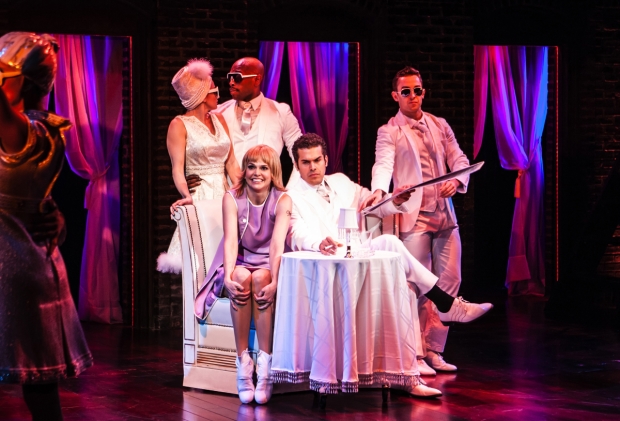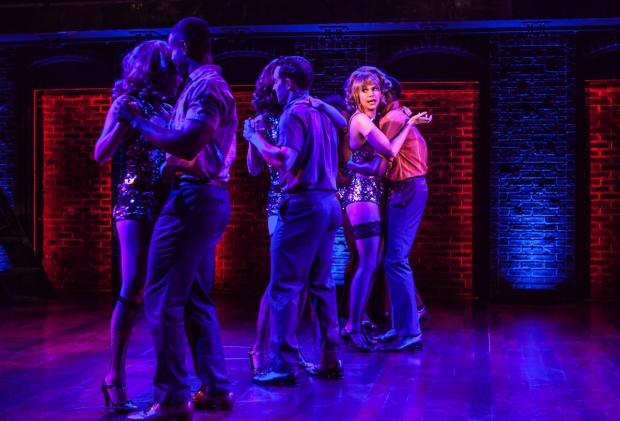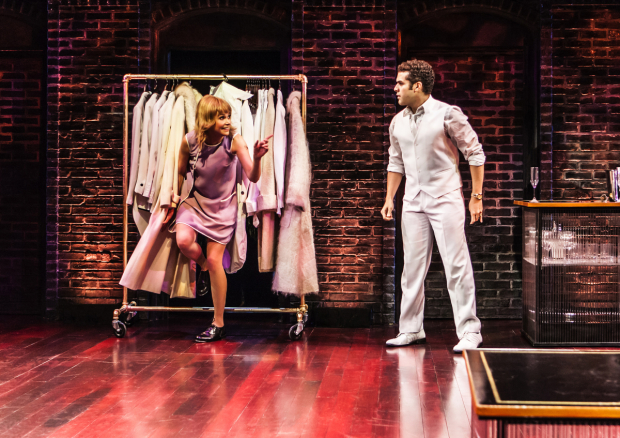Sweet Charity

(© Monique Carboni)
If you were under the impression that Sweet Charity is just a fun musical about the misadventures of a cartoonish taxi dancer, director Leigh Silverman has a surprise for you. Her revival production at the New Group is both smartly conceived and emotionally resonant, with more than a hint of darkness where there was once only glitz.
The show debuted at the Palace Theatre in 1966 and has been revived twice on Broadway since then. Featuring classic numbers like "Big Spender" and "If My Friends Could See Me Now," Sweet Charity has undeniably cool music by Cy Coleman and clever lyrics by Dorothy Fields. Neil Simon's book is hilarious, if slightly dated (a shady dig at Norman Mailer was received with crickets when I attended). This intimate off-Broadway mounting seamlessly welds comedy to tragedy with the help of one of the musical theater's great leading ladies, Sutton Foster.

(© Monique Carboni)
Foster plays Charity Hope Valentine, a bright-eyed and uncommonly generous dancer-for-hire at the seedy Fandango Ballroom. She dreams of settling down, but the show begins with her lover, Charlie (Joel Perez), pushing her into the Central Park Lake in order to steal her dowry money (Silverman employs several men during the opening number, suggesting that this is a recurring event). Still, maybe she'll luck out with Italian movie star, Vittorio Vidal (also Perez), whom she bumps into outside the posh Pompeii Club right after she gives away her remaining money to street beggars. If that doesn't work out, she might find love with the homely Oscar (Shuler Hensley), who thinks of Charity as, "A virgin in the most poetical sense." Will he still think that when he finds out what she does for a living? It's not poetry, that's for sure.
If it hadn't been originated by Gwen Verdon 50 years ago, the improbably perky Charity would feel like a role written with Foster in mind. Not only does she have an innate sense for physical comedy reminiscent of Lucille Ball and Carol Burnett, but she brings genuine emotional stakes to her performance. Charity's urgency and inability to grasp the fundamentals of tactical dating aren't just the subjects of humorous pity — we feel the consequences in our guts.
The production benefits from a stellar supporting cast: The tireless Perez gives an outstanding performance of multiple roles that normally require the work of four different actors. Each of his characters is specific and thought-out, from the charmingly operatic Vittorio to the sleazy club manager Herman. Hensley brings a blinkered intensity to Oscar that feels uncomfortably real, even in this heightened musical world. Everyone in the small ensemble takes on several parts with committed vigor.

(© Monique Carboni)
Silverman has trimmed the fat from her lean staging, which breezes along at two hours and 15 minutes. It is presented in three-quarter thrust, with no one sitting more than five rows away, spare a ring of mezzanine ticketholders who are one row deep. With a backwards "Fandango" sign framed in a window behind the band, we feel like we're in the club. Derek McLane's rolling set pieces provide for quick transitions while also making it clear where we are at all times. Jeff Croiter helps complete the picture with his versatile lighting, which merges psychological intimacy with good old-fashioned razzle-dazzle.
Special accolades go to costume designer Clint Ramos, who enriches the story with every well-selected garment: The unsoiled aristocrats of the Pompeii Club wear pristine white suits, while the taxi dancers don sequined leotards that scream of desperation. The killer item is Charity's short lavender dress, which looks like a hospital smock refashioned into Peanuts-inspired couture. It infantilizes her, exposing her underwear with every high kick. Foster wears it proudly, making her look like a mental patient lost in her own cheerful delusion.
Not everyone will be pleased with some of Silverman's choices, especially musical purists: Mary-Mitchell Campbell's tidy orchestrations for the six-woman band are surprisingly robust, but may still leave you hungry for that brassy Coleman sound (especially during the brassless "I'm a Brass Band"). Music director Georgia Stitt takes an easy tempo on the production numbers, giving them an oddly sedate vibe that doesn't always mesh with Joshua Bergasse's energetic choreography.

(© Monique Carboni)
Still, Silverman strikes at the story's essence in this scaled-down revival starring a first-rate actress who really gets it: Foster's Charity is implacably optimistic despite a lifetime of disappointment. She has made compromises in order to survive in a world that disdains her for her tenacity. This is especially true of the men in her life, who reject her because she does not pass an impossible standard of purity to which they would certainly never hold themselves. But Charity is like a lot of women: No matter how many unjust setbacks she suffers, she just keeps going.











